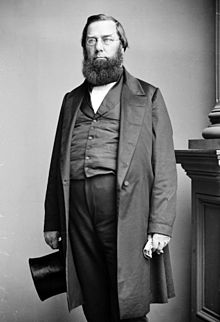George Perkins Marsh
George Perkins Marsh (March 15, 1801 – July 23, 1882) was an American lawyer, linguist, newspaper editor, politician, diplomat, and advocate of the wise use of natural resources, as well as educational opportunities for women. During his lifetime he was widely considered North America's foremost scholar of Scandinavian literature. Today he is famous as the author of the book Man and Nature; or, Physical Geography as Modified by Human Action and is often called America's first environmentalist. From 1843 to 1849 as a member of the Whig Party, he represented Vermont in the United States Congress. Marsh was, from 1849 to 1854, U.S. Minister to the Ottoman Empire and, from 1861 until his death in 1882, the U.S. Minister to the Kingdom of Italy.

Quotes
edit- The general anatomy of the camel is the same as that of other ruminants; but the hump, the horizontal posture of the head, the direction of the eye, the power of closing the nostril, the callosities upon the breast and legs, the spreading and cushioned feet, and above all the curious structure of the stomach, to which he owes his most valuable property, the power of long abstinence from water, distinguish him from all other quadrupeds.
- The camel: his organization, habits and uses considered with reference to his introduction Into the United States. Boston: Gould and Lincoln. 1856. p. 37.
- ... Things much used inevitably become much worn, and it is one of the most curious phenomena of language, that words are as subject as coin to defacement and abrasion, by brisk circulation. The majority of those who speak any tongue incline to speak it imperfectly; and where all use the dialect of books, the vehicle of the profoundest thoughts, the loftiest images, the most sacred mentions, that the intellect, the fancy, the heart of man has conceived, there special precautions are necessary to prevent that medium from becoming debased and vulgarized by corruptions of form, or, at least by association with depraved beings and unworthy themes. While, therefore, I would open to the humble and the unschooled the freest access to all the rich treasures which English literature embodies, I would inculcate the importance of a careful study of genuine English, and a conscientious scrupulosity in its accurate use, upon all who in any manner occupy the position of teachers or leaders of the American mind, all whose habits, whose tastes, or whose vocations, lead them to speak oftener than to hear.
- Lectures on the English Language. 1860. p. 16.
- The extension of agricultural and pastoral industry involves an enlargement of the sphere of man's domain, by encroachment upon the forests which once covered the greater part of the earth's surface otherwise adapted to his occupation. The felling of the woods has been attended with momentous consequences to the drainage of the soil, to the external configuration of its surface, and probably, also, to local climate; and the importance of human life as a transforming power is, perhaps, more clearly demonstrable in the influence man has thus exerted upon superficial geography than in any other result of his material effort.
Lands won from the woods must be both drained and irrigated; river banks and maritime coasts must be secured by means of artificial bulwarks against inundation by inland and by ocean floods; and the needs of commerce require the improvement of natural, and the construction of artificial, channels of navigation. Thus man is compelled to extend over the unstable waters the empire he had already founded upon the solid land.- Man and Nature. Weyerhaeuser Environmental Classics. University of Washington Press. 2003. pp. 3–4. ISBN 0295983167. (1st edition 1864; edited by David Lowenthal)
External links
edit- The Marsh Collection. Smithsonian Institution.
- Conservationist George Perkins Marsh. Vermont History (vermonthistory.org).